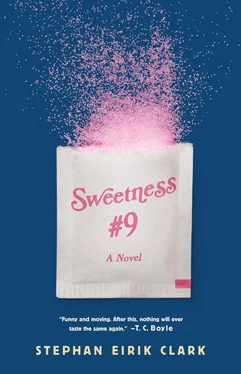My room held three bunk beds and thankfully no more than five men. After being shown to it by an orderly, I took a top bunk and spoke briefly with the patient below me, a graphologist who stood no taller than five foot two and claimed to have killed six Bolsheviks in the Crimea before his twelfth birthday. I told this White Russian I’d come here because the economy was poor and the application deadline for Ph.D. programs had passed. He said the self-admits were crazier than the committeds and that he had a deep distrust of academics.
We quickly hit it off and spent our days playing chess and dismantling Marxist theory. One moonlit evening as we sat playing on his bed, he studied my handwriting between moves and pointed to my routine shifts between cursive and print. “You’re an emotionally labile, nervous writer whose irregular baseline suggests a tendency to drift between fact and fantasy.”
I moved my rook into position and enraged him by saying he’d once again failed to protect his king.
“As for your willingness to ignore the truth, that can be seen in the large circling loops of your y’ s and g’ s. You’re probably a closeted homosexual.”
I took the medication they provided me, telling myself this would be my counter-culture, my sixties. I’d never smoked a joint, after all, or eaten a tab of lysergic acid. I’d always worked, worked, worked, and where had it gotten me? Nowhere. So down it went twice a day with a little Dixie cup of water: 50 mg of chlorpromazine, which was good enough to get the muscles in the back of my neck to pull away from my spine. There were a few side-effects — sensitivity to light, constipation and urinary retention, an increased appetite and weight gain — but this was a small price to pay for peace of mind. I spent my days like a schoolboy, curled up in a chair and reading Alistair MacLean.
One evening in the dining room, I found myself sitting across from an old man whose intellect or medication kept his face locked in an intimidating, toothless smile. It was from him that I learned of the state’s other psychiatric hospital, in Trenton, where earlier in the century the esteemed Dr. Henry Cotton, believing tooth rot the cause of insanity, had achieved a much-lauded cure rate by leaving his inmates without so much as a molar or canine with which to chew their daily gruel.
Near this time I read in the papers that Sweetness #9 had been submitted to the FDA for approval, and I tried to tell the doctors about the many rats and monkeys I’d known. I used clinical terms only those employed in my field would have had at their command, but whenever I said anything especially meaningful (“They replaced the fat monkeys with thin ones”), my doctor shared a look with his Pakistani internist that made me push my tongue up over my front teeth. I didn’t want to be branded a paranoid schizophrenic and kept here forever; I just wanted a nice little rest. So I began to strike a balance between world-weary and deeply troubled, and I left the true talk of my past to my hushed late-night conversations with the White Russian.
He thought it absurd. Because if they’d replaced the fat monkeys with thin ones overnight, that meant they either kept a few spare monkeys in the basement for just such a purpose or had called someone who specialized in the express delivery of primates. And who was this, some cleaner who gets paid handsomely for erasing all evidence of corporate crimes? A man whose name moves with a whisper from the lips of one CEO to the next?
“Are you telling me there’s a psychopath out there with ties to both the Fortune 500 and the zoological communities? Tell me,” he said. “I need to know.” He thought it more likely that my mind had played tricks on me. “You were tired, sleepless, drinking too much caffeine, possibly sterile. Your wife had just lost a baby, you were alone and half-drunk. Am I wrong or am I right?” He led me through my recollections, reminding me that the first time I’d seen those monkeys, they’d been sitting in the shadows of their cages. And the following morning, the monkey I’d thought too thin had been out and dancing on Hickey’s shoes, its body stretched to its full height. “Couldn’t it be a question of shadow and light, of posture? Or what? Are you telling me there’s a handful of fat monkeys lying in a shallow grave somewhere in South Jersey? I’m crazy,” he said, tapping at his barrel chest. “I’ve got the paperwork to prove it. But if sanity’s what you’d have me believe, I don’t want anything to do with it. I’ll ask for another pillow and serve out my time here.”
My god, I thought, what have I done? And for the first time it wasn’t the memory prompted by this question that troubled me, but the uncertainty of that recollection. What had I done?
All through that winter, with the exception of one Saturday when an ice storm made the roads impassable, Betty came on visiting day and sat with me for an hour or two in the day room. Sometimes we simply stared out the window, as silent as a couple married for fifty years; other days she’d do all the talking, telling me about the course in marketing she was thinking about taking or how many miles she’d jogged that week.
When the snow receded and the sun began to rise higher over the hills, my mood improved, and we started to take long, meandering walks through the slow-blooming forest.
Once, in March or April, we even ran off the designated path and up over a dale to a hidden alcove beneath the exposed roots of a toppled tree. It was like we were young lovers again. Betty giggled when she saw me staring at her and realized my intent, and then, with spring’s first rush of warm air exciting our bodies, she tore at my clothes as fiercely as I pulled at hers. Crows cawed from the trees; raccoons and rabbits scurried by. I turned Betty round to take her in a way I’d never done before, and then, as a deer froze on the horizon, realizing our presence, we joined in on the natural cacophony and threw our sounds of pleasure into the wind.
It was just that one time, though. When on the following weekend I led her in the same direction, we both knew what was coming and couldn’t help but react awkwardly. Betty worried about ticks. I kept hearing footsteps.
By late spring, Betty had had enough. One afternoon in the day room, she moved her wicker chair in front of mine and spoke to me slowly, carefully, as if she imagined me lost behind a haze of pharmaceuticals. “This has to stop, David. You’ve been here long enough. Now, will you leave with me?”
“How’s our savings account look?”
She fell back in her chair. “Grim,” she admitted.
“And so is that why you need me to come home? So I can find a job and provide for you?”
“David.”
“Until you get your degree, that is, and can provide for yourself.”
“What are you saying?”
“I think you know what I’m saying.”
Having so much time to myself had allowed me to work on this thought until it was frayed like a piece of rope. Betty was going to leave me as soon as she had her degree. That’s why she was jogging and beginning to lose weight. She was preparing for her reentry to society.
“You’re being cruel, David. For five months I’ve stuck by you, and now you’re being cruel.”
We sat together for another minute or more, silently, and then I watched as she walked the length of the day room floor and pushed through the double doors past the nurses’ station. It was for the best, I told myself. When she sent me a letter later that same week, saying she wouldn’t be coming to visit me anymore, I told myself what I’d been telling myself since I’d last seen her: it was most certainly for the best. Because where could I go? What could I do? She wanted a family, a proper family, and could I provide for one while working at a gas station? Or feel good about myself if she was bringing home the bacon and frying it up in the pan? Today, stay-at-home fathers who measure out their lives in dirty diapers are looked upon with kindness, not pity. Back then there was only one word for them: bums. So I decided it was better to let her go and find a new life rather than be weighed down by a man like me.
Читать дальше












